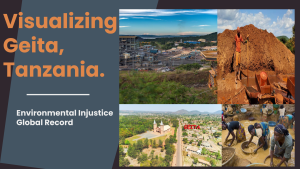Visualizing Geita
xxxx

xxxx

The argument is supported through research into political trends - the survivors gave up their own values to support anyone that could help them. There were interviews with the survivors and those living in the area - they dicussed how their lives changed, their inability to find work and their health issues that started immediately or soon after the disaster. The authors also did research of programs to help the survivors - looking at the compensation they could recieve, options for working, how to get healthcare, etc.
The article's bibliography contains many references including the WHO, the Red Cross, and other organizations, as well as many other experts and professionals in the field.
**Linda not Laura as I previously stated
The federal government funds OSHA.
Many other research papers, articles, books, and sources of research were referencd in the article. The author read and studied a lot of research in various areas and covering all of the topics discussed in this paper, then strengthened ideas and concepts with enough support from hard research to write this article.
"Two FDNY EMTs who had to intervene to stop four police officers beating a handcuffed patient on a stretcher have turned the cops in to authorities"
""Three cops began to punch the patient in the face, EMS (had) to get in the middle of it to intervene. Pt's. wounds and injuries cleaned in the (ambulance)," the report said."
The convention in 1951 was a response to WW2 and the vast amounts of refugees that existed as a result. States involved in the convention and the UN could decide to apply it to refugees not necessarily from WW2, but in 1967, the limits were removed and made it so that it could apply to any refugees, not just those from WW2. It has since been used during major refugee crises in Africa, the Middle East, and Asia.
Artisanal or Snall Scale Mining in Geita.